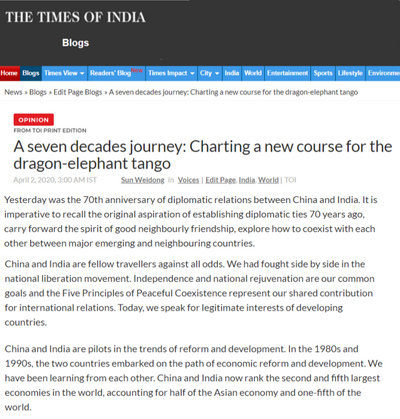|
On April 2nd, 2020, Chinese Ambassador to India H.E. Sun Weidong published an article entitled "A Seven Decades Journey: Charting a New Course for the Dragon-Elephant Tango" in The Times of India on the 70th anniversary of the establishment of diplomatic relations between China and India. The full text is as follows:

Yesterday was the 70th anniversary of diplomatic relations between China and India. It is imperative to recall the original aspiration of establishing diplomatic ties 70 years ago, carry forward the spirit of good neighbourly friendship, explore how to coexist with each other between major emerging and neighbouring countries.
China and India are fellow travellers against all odds. We had fought side by side in the national liberation movement. Independence and national rejuvenation are our common goals and the Five Principles of Peaceful Coexistence represent our shared contribution for international relations. Today, we speak for legitimate interests of developing countries.
China and India are pilots in the trends of reform and development. In the 1980s and 1990s, the two countries embarked on the path of economic reform and development. We have been learning from each other. China and India now rank the second and fifth largest economies in the world, accounting for half of the Asian economy and one-fifth of the world.
China and India are practitioners of mutual learning among civilisations. We have a long history of trade and exchange. Originating in India, Buddhism thrived in China. Today, people-to-people and cultural exchanges between us set off a new wave, with 14 pairs of sister provinces or cities and mutual personnel visits exceeding one million annually.
China and India are partners sailing in the same boat. Facing outbreaks of Covid-19 around the world, we are helping each other. At the Extraordinary G20 Leaders' Summit, President Xi Jinping emphasized that it is imperative for the international community to strengthen confidence, act with unity and work together in a collective response. Prime Minister Narendra Modi sent a letter of condolence to President Xi.
State councillor and foreign minister Wang Yi had two phone calls with external affairs minister S Jaishankar. Wang expressed sympathy and solidarity with India, and said China is ready to share our experience, provide support within our capacity. China has provided assistance for the return of Indian citizens in Hubei province. Two batches of medical supplies donated to the Indian Red Cross Society by Chinese charity organisations have arrived in Delhi. It highlights the spirit of mutual assistance and working together through thick and thin.
We can draw some enlightenment from this hard-won relation. First, adhere to strategic guidance given by the leaders. Over the past 70 years, our two leaders have grasped the general direction of China-India relations from a strategic and overall perspective, and steered the course of bilateral relations. Xi and Modi held two informal summits to conduct strategic communication, and reached a series of important consensus decisions.
Second, stay on the general trend of friendly cooperation. China and India have a history of friendly exchanges for more than 2,000 years. Friendly cooperation, which has dominated most of the time, is the prevailing theme. Our joint efforts in combating Covid-19 pandemic today remind me of the great sacrifice made by Dwarkanath Kotnis, whose spirit is a precious legacy for China-India relations.
Third, add impetus to mutually beneficial cooperation. China and India share similar national conditions, and both are at a critical stage of economic development. There's great potential for bilateral cooperation in medicine, information technology, agriculture, poverty reduction and connectivity, etc.
Fourth, strengthen coordination in international and regional affairs. China and India are important members of multilateral mechanisms such as the Brics, SCO, G20, WTO, China-Russia-India cooperation. We shoulder the responsibility to ensure the legitimate interests of developing countries, speak up for emerging economies, and forge a more fair, equitable and rational international order.
Fifth, handle the differences properly. The two sides have established mechanisms to manage differences and seek a constructive solution through dialogue. Our common interests far outweigh the differences. The two sides should expand cooperation and curb negative factors to proactively shape bilateral relations and break the circle of ups and downs.
The China-India relations stand at a new starting point now and usher in new opportunities. We should explore a way to get along with each other as follows:
Enhancing mutual trust is the foundation. Only through mutual respect and trust, consultation on an equal footing, can the two sides correctly view each other's development intention, deepen the basic judgment that China and India are partners rather than rivals, representing opportunities rather than threats to each other.
Focusing on cooperation is the approach. The two sides should actively seek convergence of interests, seize all opportunities for cooperation, and achieve mutual benefit and win-win results by making the pie of cooperation even bigger.
Managing differences is the assurance. The two sides should always bear in mind the overall picture of bilateral relations, put differences in appropriate places and deal with them properly.
Seeking common development is the direction. China and India should join hands with other developing countries in achieving economic development, people's happiness and national rejuvenation, which is an integral component of building a community with a shared future for mankind.
I am confident that China and India have the vision and capacity to take a "dragon-elephant tango" on a glorious journey in the next 70 years, and write a new chapter in building a community with a shared future for mankind.
|